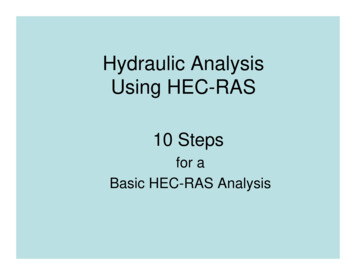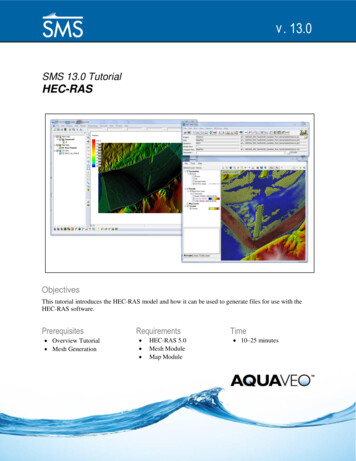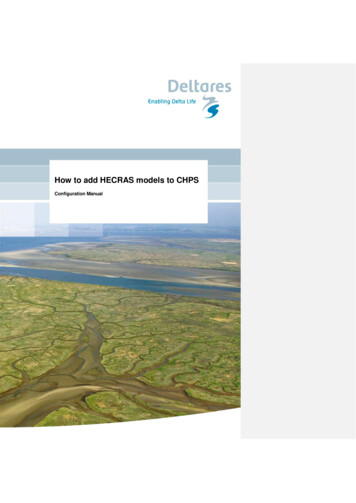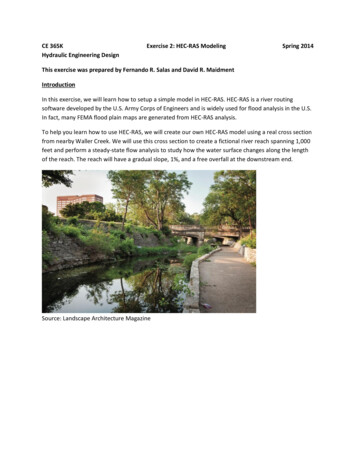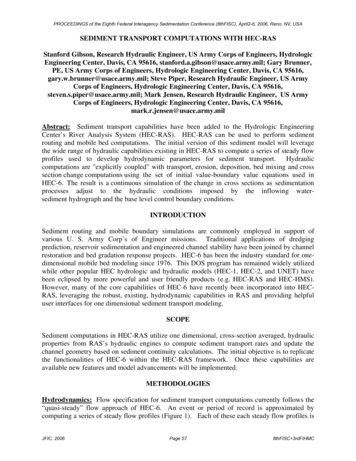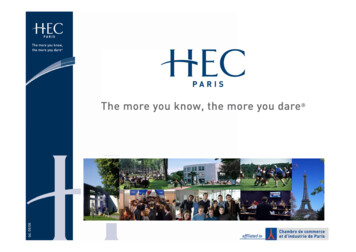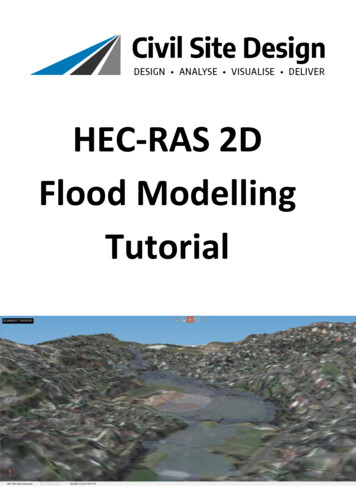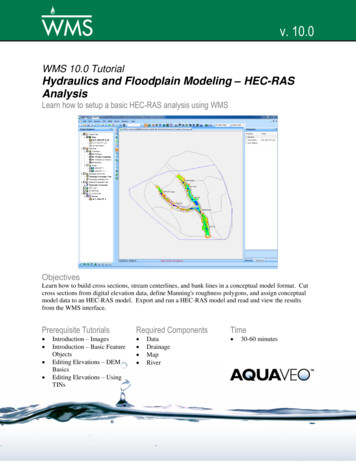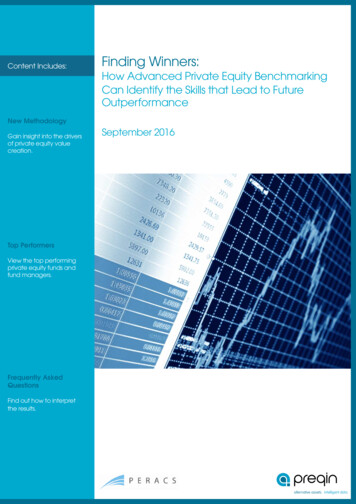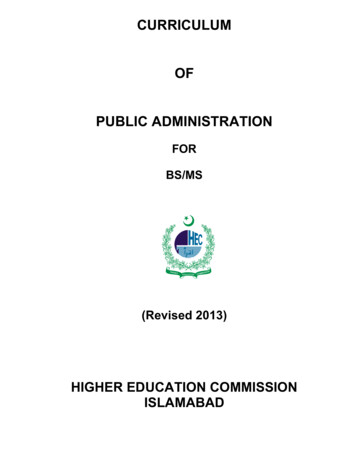
Transcription
CURRICULUMOFPUBLIC ADMINISTRATIONFORBS/MS(Revised 2013)HIGHER EDUCATION COMMISSIONISLAMABAD
CURRICULUM DIVISION, HECProf. Dr. Mukhtar AhmedExecutive DirectorMr. Fida HussainDG (Academics)Mr. Rizwan ShaukatDeputy Director (Curri)Mr. Abid WahabAsst. Director (Curri)Mr. Riaz-ul-HaqueAsst. Director (Curri)Composed by: Mr. Zulfiqar Ali, HEC, Islamabad2
Table of Content1. Introduction62. Structure for BS Public Administration93. Layout for BS Public Administration104. Scheme of Studies for BS125. Detail of Courses156. Structure for MPA/MS/MPhil in Public Administration847. Recommendations1013
PREFACEThe curriculum, with varying definitions, is said to be a plan of the teachinglearning process that students of an academic programme are required toundergo. It includes objectives & learning outcomes, course contents,scheme of studies, teaching methodologies and methods of assessment oflearning. Since knowledge in all disciplines and fields is expanding at a fastpace and new disciplines are also emerging; it is imperative that curricula bedeveloped and revised accordingly.University Grants Commission (UGC) was designated as the competentauthority to develop, review and revise curricula beyond Class-XII videSection 3, Sub-Section 2 (ii), Act of Parliament No. X of 1976 titled“Supervision of Curricula and Textbooks and Maintenance of Standard ofEducation”. With the repeal of UGC Act, the same function was assigned tothe Higher Education Commission (HEC) under its Ordinance of 2002,Section 10, Sub-Section 1 (v).In compliance with the above provisions, the Curriculum Division of HECundertakes the revision of curricula after every three years through respectiveNational Curriculum Revision Committees (NCRCs) which consist of eminentprofessors and researchers of relevant fields from public and private sectoruniversities, R&D organizations, councils, industry and civil society byseeking nominations from their organizations.In order to impart quality education which is at par with internationalstandards, HEC NCRCs have developed unified templates as guidelines forthe development and revision of curricula in the disciplines of Basic Sciences,Applied Sciences, Social Sciences, Agriculture and Engineering in 2007 and2009.It is hoped that this curriculum document, prepared by the respectiveNCRC’s, would serve the purpose of meeting our national, social andeconomic needs, and it would also provide the level of competency specifiedin Pakistan Qualification Framework to make it compatible with internationaleducational standards. The curriculum is also placed on the website of HEC(www.hec.gov.pk).(Fida Hussain)Director General (Academics)4
CURRICULUM DEVELOPMENT PROCESSSTAGE-ISTAGE-IISTAGE-IIISTAGE-IVCURRI. UNDERCONSIDERATIONCURRI. IN DRAFTSTAGEFINAL STAGEFOLLOW UPSTUDYCOLLECTION OFRECAPPRAISAL OF 1STDRAFT BY EXP. OFCOL./UNIVPREP. OF FINALCURRI.QUESTIONNAIRECONS. OF CRC.FINALIZATION OFDRAFT BY CRCINCORPORATIONOF REC. OF V.C.C.COMMENTSPREP. OF DRAFTBY CRCAPPROVAL OFCURRI. BY V.C.C.PRINTING OFCURRI.REVIEWIMPLE. OFCURRI.BACK TOSTAGE-IAbbreviations Used:CRC.Curriculum RevisionCommitteeVCC. Vice Chancellor’s CommitteeEXP. ExpertsCOL. CollegesUNI.UniversitiesPREP. PreparationREC. RecommendationsORIENTATIONCOURSES5
IntroductionThe final meeting of National Curriculum Revision Committee in the discipline ofPublic Administration was held on May 7-9, 2013 at Higher Education Commission,Regional Centre, Lahore. The purpose of the meeting was to finalize the curriculumof Public Administration reviewed by NCRC in its preliminary meeting held onDecember 19-21, 2012 at the same venue. The following participants attended themeeting:1.Prof. Dr. Nasira Jabeen,Professor & Director,Institute of Administrative Sciences,University of the Punjab,Lahore.Convener2.Prof. Dr. Muhammad Bux Burdey,Professor & Chairman,Department of Public Administration,University of Sindh,Jamshoro.Dr. Jan Mohammad,Director,Institute of Management Sciences,University of Balochistan,Quetta.Prof. Dr. Muhammad Ishaque Fani,Professor & Director,Institute of Social Sciences,Bahauddin Zakariya University,Multan.MemberDr. M. Ejaz Sandhu,Dean,Department of Commerce & ManagementSciences, Minhaj University,Lahore.Dr. Najib Ullah Khan,Associate Professor,,Department of Public Administration,Gomal University, D.I. Khan.MemberMr. Mohammad Farhan Sadiq,Assistant Professor,Department of Management Sciences, VirtualUniversity of Pakistan,Lahore.Mr. Naveed Ahmed,Lecturer,Department of Public Administration,University of Peshawar, mberMember6
9.10.Mr. Fiaz HussainLecturer,Department of Public Administration,Fatima Jinnah Women University,Rawalpindi.MemberMr. Muhammad AliLecturerInstitute of Social Sciences,Bahauddin Zakariya University, Multan.2.The following participants could not attend the meeting due to otherengagements:1.Prof. Dr. Noor Shah,Professor,Department of Public Administration,Shah Abdul Latif University,Khairpur.2.Dr. Muhammad Asif Khan,Associate Professor,Department of Business Administration, Institute ofBusiness and Technology,Karachi.3.Dr. Aamer Taj,Assistant Professor & Programme Coordinator,Institute of Management Sciences,Peshawar.4.Prof. Dr. Khalid Iraqi,Chairman,Department of Public Administration,University of Karachi,Karachi.5.Prof. Dr. Razia Musarrat,Chairperson & Dean,Faculty of Arts, Department of Political Science, TheIslamia University,Bahawalpur.6.Prof. Siraj Jamal Siddiqui,Professor,Department of Business Administration, Iqra University,Karachi.7.Dr. Zareen Abbasi,Associate Professor,Department of Public Administration,University of Sindh,Jamshoro.[7
8.Dr. Nadir Ali Kolachi,Associate Professor,Department of Management Sciences,Shaheed Zulfikar Ali Bhutto Institute of Science andTechnology (SZABIST), Karachi.9.Dr. Shahid Ali,Assistant Professor,Department of Management Science,Institute of Management Sciences,Peshawar.Dr. Gohar Zaman,Associate Professor,Department of Management Sciences,Islamia College University,Peshawar.10.3.The meeting started with the recitation of Holy Verses from the Holy Quranby Mr. Farrukh Raza, Assistant Director (Curriculum), HEC. He welcomed theMembers of NCRC on behalf of the HEC. After brief introduction of the participants,the Assistant Director (Curriculum), HEC, handed over floor of the house to theConvener and Secretary of NCRC viz. Prof. Dr. Nasira Jabeen, Professor &Director, Institute of Administrative Sciences, University of the Punjab, Lahore andMr. Mohammad Farhan Sadiq, Assistant Professor, Department of ManagementSciences, Virtual University of Pakistan, Lahore, for further proceedings of themeeting.4.The Convener of NCRC thanked the HEC for providing an opportunity toreview/finalize the curriculum of Public Administration and recalled the proceedingsof the preliminary meeting. She further requested the participants to give theirsuggestions/inputs for the improvement of the curriculum and opened the house fordiscussion. After thorough and detailed deliberations, the house unanimouslyapproved the curriculum ofPublic Administration for BS, MS/MPhil and made therecommendations as Annexed.5.The Convener and Secretary of the Committee thanked all the Members forsparing their valuable time and quality contribution towards finalizing the curriculum.The Committee highly admired the efforts made by the officials of HEC as well formaking excellent arrangements to facilitate the smooth work by the Committee andtheir comfortable accommodation/stay at Lahore.6.The meeting ended with the vote of thanks to the Chair as well asparticipants of the meeting.8
STRUCTURE FOR BS PUBLIC ADMINISTRATION8 Semesters/4 Year ProgrammeSr.CategoriesNo. ofCoursesMin-MaxCreditHoursMin-Max1.A.Compulsory Requirement (No choice)9–92.B.7–821 – 243.C.10 – 1130 – 334.D.12 – 1436 – 425.E.General Courses (to be chosen fromother departments)Discipline Specific FoundationCoursesMajor Courses including researchproject / Internship Report & Viva VoceElectives within the Major4–412 – 12 TotalTotal numbers of Credit HoursDurationSemester DurationNumber of SemestersCourse Load per SemesterNumber of Courses per Semester42-4525 – 25124-136124-1364 years16-18 weeks815-18 Cr hrs.4-69
LAYOUT FOR BS PUBLIC ADMINISTRATION8 Semesters/4-Year ProgrammeCompulsoryRequirements (thestudent has no choice)Category A9 courses25 Credit hoursSubjects1. EnglishComprehension /English I2. Introduction toComputer3. Pakistan Studies4. Technical EnglishWriting/ English II5. Islamic Studies/Ethics(for non-Muslimstudents)6. Fundamentals ofMathematics7. Introduction toStatistics8. CommunicationSkills/English III9. English IV /InternationalLanguage (Any)General Courses to bechosen from otherDepartmentsCategory B7 courses21 Credit hoursSubjects1. Administrative Ethics2. Government &Society in Pakistan3. InternationalRelations4. Introduction toPsychology5. Introduction toSociology6. Logic & CriticalThinking7. Science, Society &Development8. World Civilization9. Politics &Administration10. EnvironmentalIssues &Management11. Any RelevantCourseMajor CoursesCategory D12 courses36 Credit hoursSubjects1.2.3.4.5.6.7.Administrative Law &AccountabilityApplied Statistics for ManagersBusiness FinanceDecentralization & GovernanceFinancial ManagementGovernment Business & CivilSocietyHuman Resource ManagementDiscipline Specific FoundationCoursesCategory C10 courses30 Credit hoursSubjects1. Contemporary Issues ofPublic Administration inPakistan2. Financial Accounting3. Introduction toDevelopment Economics4. Introduction to PublicAdministration5. Introduction to PublicPolicy6. Microeconomics7. Macroeconomics8. Organizational Behavior9. Principles of Management10. Principles of Marketing11. Principles of PublicFinance12. Any Other RelevantCourseElective Courses within MajorCategory E4 courses12 Credit -IIIElective-IVProposed Areas of Specialization10
8.9.10.11.12.13.14.15.16.17.18.Managerial EconomicsManaging Public & Non-ProfitOrganizationsPolitical & ConstitutionalDevelopment in PakistanProject ManagementPublic Policy AnalysisResearch Methods & TechniquesSocial EntrepreneurshipStrategic Management(Research Project/InternshipReport)& Viva VoceComprehensive Exam/Viva Voce(Optional)Any Other Relevant Course(s)A.B.C.D.E.F.G.H.Development StudiesEducation ManagementE-GovernanceFinanceHuman Resource ManagementMarketingPublic Health AdministrationPublic PolicyNotes:The universities may select any one of the below options to award six (06) credit hours;1. Internship (6-8 weeks) Internship Report Write-up Viva Voce2. Research Project Viva Voce3. Internship (6-8 weeks) Research Project Viva Voce11
Scheme of Studiesfor BPA/BS Public Administration(4-Year Programme)Course TitleEnglish Comprehension / English IIntroduction to ComputersPakistan StudiesIntroduction to Public AdministrationMicroeconomicsCourse TitleTechnical English Writing / English IIIntroduction to SociologyIslamic Studies/EthicsFundamentals of MathematicsMacroeconomicsPrinciples of ManagementCourse TitleIntroduction to StatisticsCommunication Skills / English IIILogic & Critical ThinkingFinancial AccountingSEMESTER NO. 1TypeAAACCNoneNoneNoneNoneNoneTotal Credit hoursSEMESTER NO. 2TypePre RequisitePre RequisiteABAACCEnglish INoneNoneNoneMicroeconomicsNoneTotal Credit hoursSEMESTER NO. 3TypeAABCAdministrative EthicsBIntroduction to PsychologyBPre RequisiteNoneEnglish I & IINoneNoneIntroduction to PublicAdministrationNoneTotal Credit 2
Course TitleSEMESTER NO. 4TypeInternational Language (Any) / English IVOrganizational BehaviorWorld CivilizationIntroduction to Public PolicyPrinciples of MarketingHuman Resource ManagementPre RequisiteNone / English I , II & IIIIntro. to Psychology &Principles of ManagementBNoneCIntroduction to PublicAdministrationCNoneDPrinciples of ManagementTotal Credit hoursSEMESTER NO. 5Course TitleGovernment & Society in PakistanPrinciples of Public FinanceIntroduction to Development EconomicsApplied Statistics for ManagersPolitical & Constitutional Development inPakistanFinancial ManagementACTypeBCCDDPre RequisitePak. StudiesMicro & Macro EconomicsMicro & Macro EconomicsIntroduction to StatisticsPakistan StudiesFinancial AccountingTotal Credit hoursSEMESTER NO. 6Course TitleDTypeResearch Methods & TechniquesDAdministrative Law & AccountabilityInternational RelationsDBDecentralization & GovernanceDSocial EntrepreneurshipDPublic Policy AnalysisBPre RequisiteIntro to Statistics & AppliedStatistics for ManagersNoneNoneGovt. & Society in Pakistan,Pol. & ConstitutionalDevelopment in PakistanIntro to Sociology, Principlesof ManagementIntroduction to Public Policy,Micro & Macro EconomicsTotal Credit 13
SEMESTER NO. 7Course TitleArea of Specialization Course – IArea of Specialization Course – IIStrategic ManagementManaging Public & Non-ProfitOrganizationsTypePre RequisiteENoneENoneDPrinciples of ManagementDPrinciples of ManagementIntro to Public Admin &Government & Society inPakistanTotal Credit hoursSEMESTER NO. 8TypCourse TitleePre RequisiteArea of Specialization Course – IIIENoneArea of Specialization Course – IVENoneProject ManagementDFinancial Management(Research Project / Internship Report) &Research Methods &DViva VoceTechniquesTotal Credit hoursTotal No. of Credit hoursContemporary Issues of Public Admin inPakistanCCr.Hrs.3333315Cr.Hrs.33361513014
DETAIL OF COURSESCourse 1Category ATitle: English Comprehension (English 1)(3 Credit Hours)Learning objectives:Objectives of the course are to enhance language skills for effective communicationand develop critical thinking while writing.Learning outcomes:By the end of this course, it is expected that the student will be able to: Further develop their skills in reading, writing, speaking and thinking. Develop their understanding and appreciation of English language and itsuse in effective communication and literature. Develop, understand and appreciate essay writing, short stories and furtherdevelop ability to evaluate and understand written material. Develop effective business communication skills and enhance presentationskills.Course contents:The contents of the course include: Basics of Grammar; Parts of speech and use ofarticles; Sentence structure, active and passive voice; Practice in unified sentence;Analysis of phrase, clause and sentence structure; Transitive and intransitive verbs;Punctuation and spelling.Recommended Text:1. Grammara. A.J. Thomson and A.V. Martinet. Exercises 1. Practical EnglishGrammar 3rd edition. Oxford University Press. 1997. ISBN0194313492b. A.J. Thomson and A.V. Martinet. Exercises 2. Practical EnglishGrammar Third edition. Oxford University Press. 1997. ISBN01943135062. Writinga. Marie-Christine Boutin, Suzanne Brinand and Francoise Grellet.Writing. Intermediate. Oxford Supplementary Skills. FourthImpression 1993. ISBN 019435405 7 Pages 20-27 and 35-41.3. Reading/Comprehensiona. Brain Tomlinson and Rod Ellis. Reading. Upper Intermediate. OxfordSupplementary Skills. Third Impression 1992. ISBN 0 19 453402 2.15
Course 2Title: Introduction to Computers(3 Credit hours)Learning objectives:Knowing the importance of information technology, this course is designed to let thestudents know about working and applications of computer in biological sciences. Inthis course, students will understand the basic principles on which computer worksand will familiarize themselves with some of the important software componentsfound on a PC. Another main objective of this course is to familiarize the studentswith word processing, spreadsheet analysis and use of computer to retrieve andcommunicate information.Learning outcomes:By the end of this course, the students must be able to:1. Demonstrate their computing skills like use of word processors, makingpresentations, using spreadsheets, using internet for browsing/surfing and emailing etc.2. Have knowledge about computer hardware, software and other computerapplications used for business.Course Contents:The contents of the course include: Introduction to computer software, hardwareand MS Windows. Word processing, (Microsoft word), spreadsheet analysis(Microsoft excel) and other related software package (at least two), Internet accessand different databases available on the Internet.Recommended Text & Software:1. “Fundamental Concepts of Computer System” by Asiy Sultan Ali, Amena Nurat,and Nain Kanwal. 6th edition or later.2. “Basic Computers for Beginners” by Michael Douglas, and Stephen Pelton,Published by Web Wise Seniors, Inc., (Latest Edition)3. “Peter Norton’s Introduction to Computers” by Peter Norton 4 th Edition or Later.4. “Introduction to Computers” by Garry B. Shelly, Steven M. Freund, Misty E.Vermaat. Latest Edition.Course3Title: Pakistan Studies(3 Credit hours)Learning objectives: Develop vision of historical perspective, government, politics, contemporaryPakistan, ideological background of Pakistan.Study the process of governance, national development, issues arising in themodern age and posing challenges to Pakistan.Learning Outcomes:By the end of this course, the students must have good understanding ofGovernment and Political system of Pakistan in historical and current perspectives.16
Course Contents:The contents of the course include: Historical Perspective of Pakistan, Governmentand Politics in Pakistan, Contemporary PakistanRecommended Text:1. Burki, Shahid Javed. (1980): State & Society in Pakistan, the Macmillan PressLtd.2. Akbar, S. Zaidi. (2000): Issue in Pakistan’s Economy.Karachi: OxfordUniversity Press.3. S.M. Burke and Lawrence Ziring. (1993): Pakistan’s Foreign policy: A Historicalanalysis. Karachi: Oxford University Press.4. Mehmood, Safdar: (1994) Pakistan Political Roots & Development. Lahore.5. Wilcox, Wayne:(1972) the Emergence of Bangladesh, Washington: AmericanEnterprise, Institute of Public Policy Research.6. Mehmood, Safdar. Pakistan Kayyun Toota, Lahore: Idara-e-Saqafat-e-Islamia,Club Road.7. Amin, Tahir. Ethno -National Movement in Pakistan, Islamabad: Institute ofPolicy Studies, Islamabad.8. Ziring, Lawrence. (1980): Enigma of Political Development. Kent England: WmDawson & sons Ltd.9. Zahid, Ansar (1980): History & Culture of Sindh. Karachi: Royal Book Company,1980.10. Afzal, M. Rafique (1998): Political Parties in Pakistan, Vol. I, II & III. Islamabad:National Institute of Historical and cultural Research.11. Sayeed, Khalid Bin. (1967): The Political System of Pakistan. Boston: HoughtonMifflin.12. Aziz, K.K. Party, (1976) Politics in Pakistan, Islamabad: National Commission onHistorical and Cultural Research.13. Muhammad Waseem, (1987): Pakistan Under Martial Law, Lahore: Vanguard.14. Haq, Noor up. (1993).Making of Pakistan: The Military Perspective. Islamabad:National Commission on Historical and Cultural Research.Course 4Title: Technical English Writing/English II(3 Credit hours)Learning Objectives:Enhance language skills, develop critical thinking and enhance presentation skills inbusiness writing.Learning Outcomes:By the end of this course, the students must be able to exhibit their good writingskills and have complete understanding of various techniques used in effectivewriting.Course contents:The contents of the course include: Presentation skills, essay writing, descriptive,narrative, discursive, argumentative, academic writing, technical report writing, andprogress report writing.17
Note: Extensive reading is required for vocabulary buildingRecommended Text:Essay Writing and Academic Writing1. Writing. Advanced by Ron White. Oxford Supplementary Skills. Third Impression1992. ISBN 0 19 4354073(particularly suitable for discursive, descriptive,argumentative and report writing).2. College Writing Skills by John Langan. McGraw-Hill Higher Education. 2004.Patterns of College Writing (4th edition) by Laurie G. Kirszner and Stephen R.Mandell. St. Martin’s Press.3. Herta A. Murphy and Herbert W. Hildebrandt. Effective BusinessCommunication.Mary Elen Guffy Essentials of Business Communication.Presentation Skills:1. The Mercury Reader. A Custom Publication. Compiled by Northern IllinoisUniversity. General Editors: Janice Neulib; Kathleen Shine Cain; StephenRuffus and Maurice Scharton.Course 5Title: Islamic Studies/Ethics (for Non-Muslims) (3 Credit hours)Learning objectives:This course is aimed at:1. Providing basic information about Islamic Studies.2. Enhancing understanding of the students regarding Islamic Civilization.3. Improving student’s skill to perform prayers and other worships.4. Enhancing the skill of the students for understanding of issues related to faithand religious life.Learning Outcomes:By the end of this course, the students must be able to show their goodunderstanding of Islamic system and Islam’s perspective on Management andPublic Administration.Course Contents:The contents of the course include: Introduction to Quranic StudiesBasic Concepts of Quran, History of Quran, Uloom-ul-Quran. Study of Selected Text of Holy Quran1. Verses of Surah Al-Baqra Related to Faith(Verse No-284-286)2. Verses of Surah Al-Hujrat Related to Adab Al-Nabi (Verse No-1-18)3. Verses of Surah Al-Mumanoon Related to Characteristics of faithful (VerseNo-1-11).4. Verses of Surah al-Furqan Related to Social Ethics (Verse No.63 -77).5. Verses of Surah Al-Inam Related to Ihkamat (Verse No-152-154).18
Study of Selected Text of Holy Quran1. Verses of Surah Al-Ihzab Related to Adab al-Nabi (Verse No.6, 21, 40, 56,57, 58).2. Verses of Surah Al-Hashar (18,19,20) Related to thinking, Day of Judgment3. Verses of Surah Al-Saf Related to Tafakar, Tadabar (Verse No-1, 14). Seerat of Holy Prophet (PBUH) I1. Life of Muhammad Bin Abdullah ( Before Prophet Hood)2. Life of Holy Prophet (S.A.W) in Makkah3. Important Lessons Derived from the life of Holy Prophet in Makkah Seerat of Holy Prophet (PBUH) II1. Life of Holy Prophet (PBUH) in Madina2. Important Events of Life Holy Prophet in Madina3. Important Lessons Derived from the life of Holy Prophet in Madina Introduction To Sunnah1.2.3.4.5.6.Basic Concepts of HadithHistory of HadithKinds of HadithUloom –ul-HadithSunnah & HadithLegal Position of Sunnah1.2.3.4.5.Basic Concepts of Islamic Law & JurisprudenceHistory & Importance of Islamic Law & JurisprudenceSources of Islamic Law & JurisprudenceNature of Differences in Islamic LawIslam and Sectarianism1.2.3.4.Basic Concepts of Islamic Culture & CivilizationHistorical Development of Islamic Culture & CivilizationCharacteristics of Islamic Culture & CivilizationIslamic Culture & Civilization and Contemporary IssuesSelected Study from Text of Hadith Introduction To Islamic Law & Jurisprudence Islamic Culture & Civilization Islam & Science1. Basic Concepts of Islam & Science2. Contributions of Muslims in the Development of Science3. Quran & Science Islamic Economic System1.2.3.4.Basic Concepts of Islamic Economic SystemMeans of Distribution of wealth in Islamic EconomicsIslamic Concept of RibaIslamic Ways of Trade & Commerce Political System of Islam1. Basic Concepts of Islamic Political System2. Islamic Concept of Sovereignty3. Basic Institutions of Govt. in Islam Islamic History1. Period of Khlaft-E-Rashida2. Period of Ummayyads3. Period of Abbasids19
Social System of Islam1. Basic Concepts Of Social System Of Islam2. Elements Of Family3. Ethical Values Of IslamRecommended Text:1. Hameed ullah Muhammad, “Emergence of Islam” , IRI, Islamabad2. Hameed ullah Muhammad, “Muslim Conduct of State”3. Hameed ullah Muhammad, ‘Introduction to Islam Mulana Muhammad YousafIslahi,”4. Hussain Hamid Hassan, “An Introduction to the Study of Islamic Law” leafPublication Islamabad, Pakistan.5. Ahmad Hasan, (1993) “Principles of Islamic Jurisprudence” Islamic ResearchInstitute, International Islamic University, Islamabad6. Mir Waliullah, “Muslim Jurisprudence and the Quranic Law of Crimes” IslamicBook Service (1982)7. H.S. Bhatia, “Studies in Islamic Law, Religion and Society” Deep & DeepPublications New Delhi (1989)8. Dr. Muhammad Zia-ul-Haq, “Introduction to Al Sharia Al Islamia” Allama IqbalOpen University, Islamabad (2001)Course 6Title: Fundamentals of Mathematics(3 Credit hours)Learning Objectives:The course aims at preparing the students, not majoring in mathematics, withthe essential tools of algebra to apply the concepts and the techniques intheir respective disciplines.Learning Outcomes:By the end of this course, the students must be able to apply Mathematics to theirreal life use.Course Contents:The contents of the course include: Preliminaries: Real-number system, complexnumbers, introduction to sets, set operations, functions, types of functions. Matrices:Introduction to matrices, types, matrix inverse, determinants, system of linearequations, Cramer’s rule. Quadratic Equations: Solution of quadratic equations,qualitative analysis of roots of a quadratic equations, equations reducible toquadratic equations, cube roots of unity, relation between roots and coefficients ofquadratic equations. Sequences and Series: Arithmetic progression, geometricprogression, harmonic progression. Binomial Theorem: Introduction to mathematicalinduction, binomial theorem with rational and irrational indices. Trigonometry:Fundamentals of trigonometry, trigonometric identities.Recommended Text:1. “The Fundamentals of Mathematics” by James Van Dyke, James Rogers, HoliAdams. 10th Edition20
2. “Essentials of College Mathematics for Business, Economics, Life Sciences andSocial Sciences” by Raymond Barnett, Michael Ziegler. 3 rd Edition or Later.3. “Algebra: Introductory and Intermediate: An Applied Approach” by RichardAufmann and Joanne S. Lockwood. 6th Edition or Later.4. Dolciani MP, Wooton W, Beckenback EF, Sharron S, Algebra 2 andTrigonometry, 1978, Houghton & Mifflin.5. Boston (suggested text)6. Kaufmann JE, College Algebra and Trigonometry, 1987, PWS-Kent Company,Boston.7. Swokowski EW, Fundamentals of Algebra and Trigonometry (6th edition), 1986,PWS-Kent Company, Boston.Course 7Title: Introduction to Statistics (3 Credit hours)Learning Objectives:The main objectives of the course are to enhance student’s competency inapplication of statistics to solve business management problems and to improvetheir level of quantitative sophistication for further advanced business analysis.Learning Outcomes:By the end of this course, the students must be able to apply Statistics to their reallife use.Course Contents:The contents of the course includes: What is Statistics, Presentation of Data,Measures of Central Tendency, Measures of Dispersion, Probability and ProbabilityDistributions. Sampling and Sampling Distributions, Hypothesis Testing, Testing ofHypothesis- Single Population, Testing of Hypotheses-Two or more Populations,Testing of Hypothesis-Independence of Attributes, Regression and Correlation etc.Recommended Text & Software:1. Walpole, R. E. 1982. “Introduction to Statistics”, 3 rd Ed., Macmillan PublishingCo., Inc. New York.2. Muhammad, F. 2005. “Statistical Methods and Data Analysis”, Kitab Markaz,Bhawana Bazar Faisalabad.3. Geraled Keller & Brain Warrack: Statistics for management and economics 7thedition4. Andrew F. Seigel,: Practical Business statistics 4th edition5. Berenson Basic Business statistics – Concepts and applications 8th edition6. SPSS (Latest Version) / End Note / E Views.Course 8Title: Communication Skills/English III(3 Credit hours)Learning Objectives:This course is intended to provide participants with advanced understanding of theconcepts and principles of professional business communication and to support thedevelopment of their skills in interpersonal, spoken and business related21
communications through practice and feedback. Course participants will beencouraged to participate actively in the course through their group presentations,reflections and academic writing.Learning Outcomes:Enable the students to meet their real life communication needs.Course Contents:The contents of the course include: Paragraph writing, Essay writing, CV andjob application, Study skills, Academic skills, Presentation skills etc.Recommended Text:Grammar Writing Reading Practical English Grammar by A.J. Thomson and A.V. Martinet. Exercises2. Third edition. Oxford University Press 1986. ISBN 0 194313 50 6.Writing. Intermediate by Marie-Chrisitine Boutin, Suzanne Brinand andFrancoise Grellet. Oxford Supplementary Skills. Fourth Impression 1993.ISBN 019 435405 7 Pages 45-53 (note taking).Writing. Upper-Intermediate by Rob Nolasco. Oxford SupplementarySkills. Fourth Impression 1992. ISBN 0 19 435406 5 (particularly good forwriting memos, introduction to presentations, descriptive andargumentative writing).Reading.Advanced.Brian Tomlinson and Rod Ellis. OxfordSupplementary Skills. Third Impression 1991. ISBN 0 19 4534030.Reading and Study Skills by John LanganStudy Skills by Richard Yorky.Course 9:As per availability of resource personTitle: International Language (Any) / English IV(3 Credit hours)Learning Objectives:To learn any other language to enhance their language skill set.Learning Outcomes:By the end of course, the students must be able to communicate in thechosen language and show a reasonable understanding in oral and writtencommunication.Course Contents:As per course selected for teaching.Recommended Text:As per course selected for teaching.22
Category BCourse 1Title: Administrative Ethics(3 Credit hours)Learning Objectives:Administrative ethics studies all moral aspects of public administration employeeand senior management activities.Three basic components of this course are: Values: Individual, group and social statements, opinions and attitudestowards concept like freedom, justice, neutrality and responsibility. Standard and Norms: The principles that guide the action of people andemployee and help lead and control
The final meeting of National Curriculum Revision Committee in the discipline of Public Administration was held on May 7-9, 2013 at Higher Education Commission, Regional Centre, Lahore. . Department of Business Administration, Iqra University, Karachi. 7. Dr. Zareen Abbasi, Associate Professor, Department of Public Administration, University .
